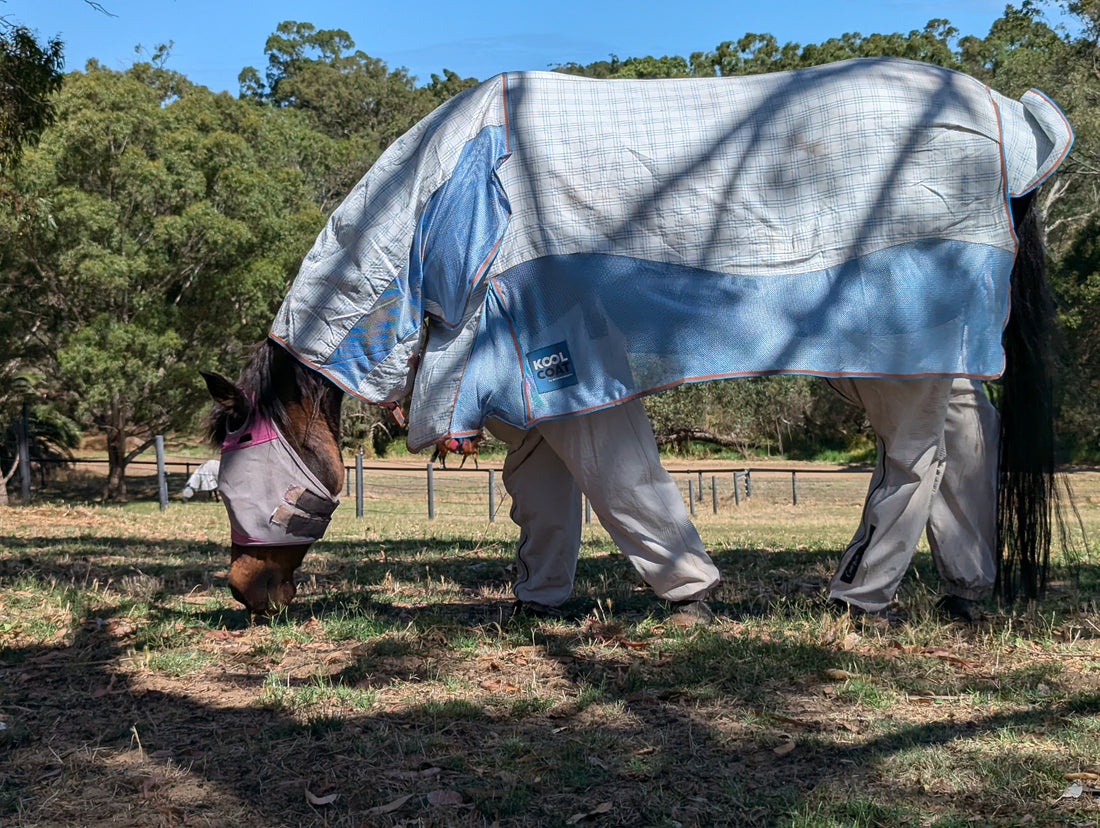Insect Bite Hypersensitivity (IBH) in Horses

Insect Bite Hypersensitivity (also known as summer eczema, sweet itch, Queensland itch or kasen) is an allergic reaction to the bites of insects. It can be a debilitating and distressing condition for your horse (and you).
Typical symptoms include itching, swelling, hair loss and skin thickening. Heat from the inflammation is an issue, exacerbated by the hot summer temperatures when insects are most prevalent.
Allergic reactions of any type are typically lifelong, requiring continuous management. Chronic conditions such as IBH usually require treatment with one or more medications, including corticosteroids, antihistamines, creams and/ sprays and these should be used strictly under veterinary advice. Immunotherapy is also something your vet may recommend.
In my opinion, pharmaceuticals to ease the condition should be used only when necessary to get the condition under control – not as a long-term strategy for management. These treatments are not without side-effects.
After addressing the immediate and urgent chronic condition, the second line of defence is to ease discomfort. The heat from inflammation can be eased with the use of cool water rinses and shampoos designed to soothe and hydrate the skin and/or repel insects. However, caution should be used with any form of repellent, especially in highly sensitive horses who can also be sensitive to the active ingredients in the repellents. Cooling should be commenced from the outset and continue while there is heat from the inflammation. But don’t restrict your cool water rinses to your IBH horses during the hot summer months – all horses can benefit from cooling.
By far the most effective way to manage horses with IBH in the long term is to protect your horse from bites in the first place!
While there has been a heavy reliance on insect repellents, I personally restrict my use of insect repellents to times when I’m working my horse. Risks from skin absorption and/or inhalation of potentially toxic ingredients are not fully understood.
Other recommended strategies include stabling to avoid excessive exposure to the insects. The use of fans or sprayers to move the air would improve the effectiveness of stabling as a strategy.
I choose to stable my horses overnight, but this is primarily for pasture management purposes and for their security. During the day my preference is to have my horses grazing as they would naturally (or at least as far as can be managed in a domesticated environment). For this reason, protection from rugs, fly veils and leg coverings is my preferred method of managing IBH in my horses.
I know that there are people opposed to covering up the horse because of the potential heat build-up. I completely agree that rugs and leg protection should be used only when necessary and that’s a whole different topic. But when you have a horse with allergies, avoiding the allergic reaction is of paramount importance and the most effective way to do that is to protect the areas of the affected areas of your horse’s body. So rugging, fly mask and leg protection wins hands down for me.
All horses in summer require shade, cool drinking water and hosing (particularly on very hot days), to help them cope with the heat. For the horse that needs protection from allergens, covering them up is necessary, but should be done with heat in mind (ie minimising heat build-up). Choosing cool protective wear is important. But also consider wetting rugs and leg protection for evaporative cooling (if your horse is not susceptible to rain scald).
If you’re interested in learning more about recommendations for management of IBH in horses I found some useful links you might like to look at.
https://thehorse.com/188994/dealing-with-insect-bite-hypersensitivity/
https://www.steinbeckpeninsulaequine.com/post/insect-bite-hypersensitivity-managing-the-itchy-horse
https://ceh.vetmed.ucdavis.edu/health-topics/insect-bite-hypersensitivity
🐴Together - making our horses’ lives better - Yvette
Disclaimer: These are my thoughts and opinions and should not be considered expert or medical advice. I recommend that you seek professional advice in relation to your horse/s.
